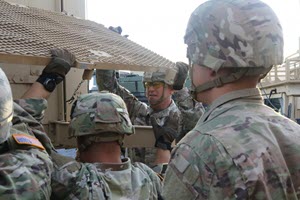Story by: Staff Sgt. Michael Giles
Posted: 06-19-2019
 Photo By Staff Sgt. Michael Giles | Maj. Gen. Patrick Hamilton, commander of the 36th Infantry Division, works with division Soldiers to load gear into a vehicle during Warfighter 19-05 at Fort Indiantown Gap, Pennsylvania, June 8, 2019. The 36th Infantry Division's Headquarters and Headquarters Company traveled to Fort Indiantown Gap in May 2019, to participate in Warfighter 19-05, a simulation designed to test command staff in decision-making and communication. (U.S. Army photo by Staff Sgt. Michael Giles)
Photo By Staff Sgt. Michael Giles | Maj. Gen. Patrick Hamilton, commander of the 36th Infantry Division, works with division Soldiers to load gear into a vehicle during Warfighter 19-05 at Fort Indiantown Gap, Pennsylvania, June 8, 2019. The 36th Infantry Division's Headquarters and Headquarters Company traveled to Fort Indiantown Gap in May 2019, to participate in Warfighter 19-05, a simulation designed to test command staff in decision-making and communication. (U.S. Army photo by Staff Sgt. Michael Giles)
FORT INDIANTOWN GAP, Pa.— The Texas Army National Guard’s 36th Infantry Division completed a large-scale command training exercise on June 12, 2019.
The division’s command staff, Headquarters and Headquarters Battalion, as well as units from five other states, Army Reserve and active U.S. Army completed Warfighter 19-5, a scenario-based exercise designed to test battlefield decision-making and communication.
“Warfighter is a computer simulation,” said Col. Edward Dextraze, the division’s senior liaison officer. “It’s a training exercise used to assess a division’s ability to execute their wartime mission in a full-spectrum operation.”
According to Dextraze, Warfighter exercises provide awareness about how ready a unit is to handle the complexity of large-scale combat operations. Warfighter reflects an actual deployment, including the challenges that arise when various sections synthesize their efforts.
“If you don’t take advantage of that compressed stress situation, when you have to do it for real for a mobilization, you’ve kind of cheated yourself,” Dextraze said.
The virtual battleground for Warfighter 19-5 was a full-scale combat exercise, a change from previous scenarios. In this scenario, United States allies requested support after being attacked by rockets, chemical agents and an invading ground force. The 36th Infantry Division deployed its forces taking the fight to the enemy. Utilizing the military decision making process, leaders made tactical choices to cross rivers, overcome geological and other modern obstacles.
Col. Oliver Mintz, the 36th Infantry Division’s chief of staff, explained that Warfighter is an unparalleled opportunity for a unit to sharpen its skills and test their fighting readiness.
“You will unequivocally come out of Warfighter better than when you went in,” Mintz said. “There’s quite simply no better training event for Army staff than Warfighter. I’ve done a number of them in my career and every single time, you learn a lot.”
Staff Sgt. Neethu Cherian, a protection staff noncommissioned officer with the 36th Infantry Division Headquarters and Headquarters Battalion, said Warfighter 19-5 was an opportunity to build on previous skills obtained while attending the Battle Staff Noncommissioned Officer course.
“You get to understand and visualize how the different Warfighter functions integrate with each other to get the job done,” Cherian said.
Cherian related a new experience she had during the exercise, when a senior leader asked her how she thought a course of action would impact the fight. Though she believed she knew the correct answer, she still experienced a moment of doubt because prior to that moment, it was an experience she had never had.
“Doctrinally, if we are assuming they’re going to use a non-persistent chemical agent, then the forces should move in now, towards the objective, while the weather is at our advantage,” she responded.
Later, she sighed a breath of relief as she double-checked the doctrinal answer. She had gotten the answer right. And now she feels more confident than ever in her role.
“Getting tested like this builds my confidence because it confirms that my knowledge held up when it all comes together,” Cherian said.
Mintz explained that learning from failure is a significant part of Warfighter.
“This is not about turning in an A-plus answer on day one,” Mintz said. “You’re going to show up. You’re going to get it wrong. You’re going to have to fix it.”
“The enemy’s going to punch you in the mouth and you’ve just got to keep getting up and getting after it,” Mintz said. “If they approach it with that attitude and are willing to learn from their mistakes every day, they’ll be on their way to a successful event.”
Maj. Gen. Patrick Hamilton, the 36th Infantry Division’s commanding general, said that although our performance during Warfighter was by no means perfect, they far exceeded expectations.
“I couldn’t be more proud of the progress we’ve made as a staff,” Hamilton said. “Our evaluators have told me that we’ve accomplished some things that other divisions haven’t been able to. That’s because of hard work and preparation.”
Hamilton said the division’s success at Warfighter is worthy of its proud historical legacy.
“Commanding the 36th Infantry Division, because of its historic lineage in combat in World War I, in World War II, and in Iraq and Afghanistan, we have big shoes to fill,” Hamilton said. “The Soldiers of the 36th Infantry Division here are absolutely stepping up and are ready to conduct operations wherever our nation calls us to go.”
“I could not be more proud of the patriotic service, the competence, dedication and the effort of the Soldiers in this division,” Hamilton said.